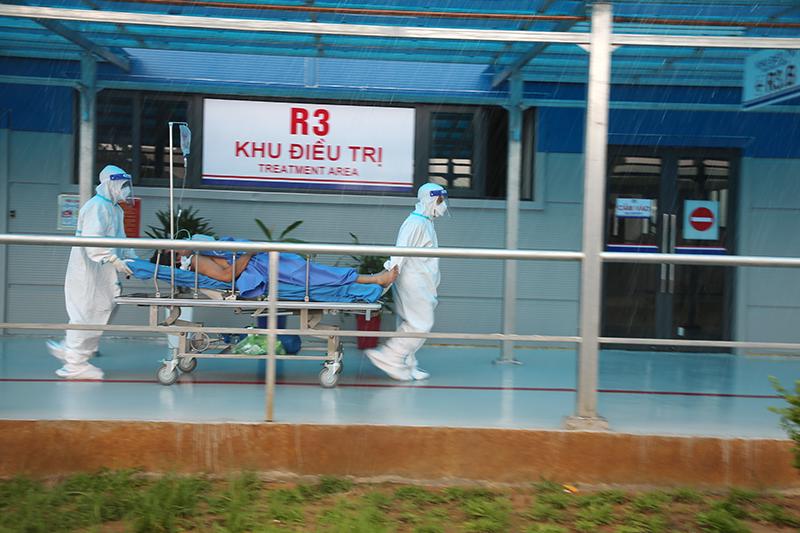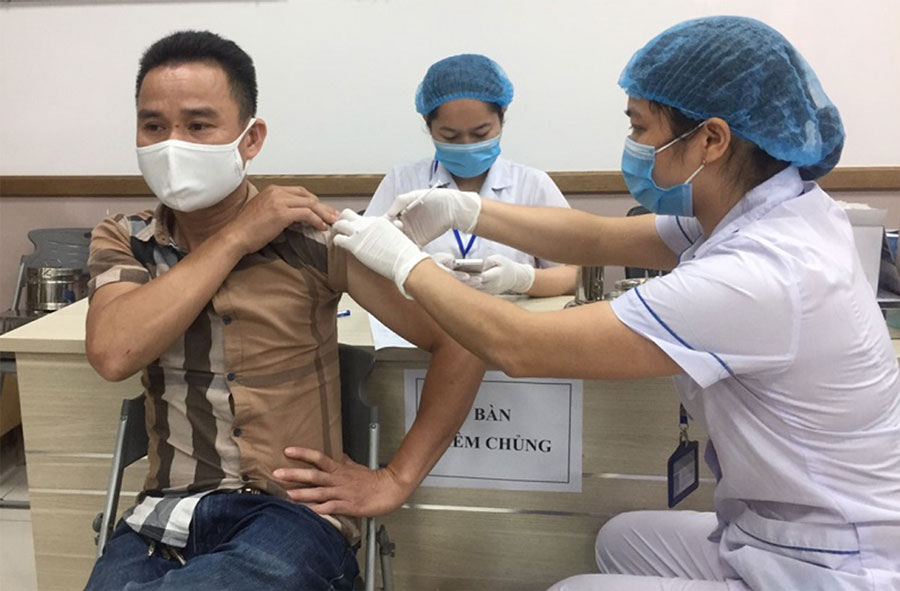Health ministry demands prudence as Covid-19 is yet to become common disease
To declare the end of Covid-19 as a pandemic, several conditions need to be met, including “detecting no new cases for 28 days in a row”.
Covid-19 should not be declared a common disease since its incidence continues to fluctuate, according to Vietnam’s Ministry of Health (MoH).
The MoH has ordered health departments to strengthen the management and reporting of new Covid-19 cases. The move came after a series of fast-spreading sub-variants of Omicron (BA.4, BA.5, BA.2.75 and BA.2.12.1) were detected in Vietnam.
The health ministry stressed that the number of new Covid-19 cases has been on the rise in both Vietnam and around the world.
| Inside a treatment area of a Covid Hospital in Hanoi. Photo: Pham Hung/The Hanoi Times |
Over the past week, Vietnam has recorded an average of 3,000 new Covid-19 cases each day. More than 100 patients are in serious conditions needing breathing support. The national Covid-19 caseload now stands at nearly 11.4 million. The total number of recoveries rose to over 10 million, the MoH reported.
The ministry said it would continue closely watching the pandemic’s evolution and regularly analyze the situation in order to build plans and scenarios for responding to any outbreak in a timely manner.
The MoH’s General Department of Preventive Medicine has asked local health authorities to update the number of new Covid-19 cases on a daily basis, and tasked them with early detection of new infections and minimizing the number of critically-ill patients and deaths.
In an interview with The Hanoi Times, Nguyen Trong Khoa, deputy director of the Department of Medical Examination and Treatment under the MoH, said for Covid-19 to be considered a common illness, it needs to meet certain criteria like occurring in a specific population group or area as well as stable and predictable incidence.
“However, in Vietnam, the number of infections has been fluctuating and the trajectory of infections changes every time there is a new variant of the novel coronavirus. The new variants constantly appear while immunity, built up either via vaccination or infection, is not stable and decreases over time. As a result, the disease could flare up again,” Khoa stressed.
Covid-19 has been under control across the country, but the number of cases is increasing recently and there are still deaths.
“Some have fixed criteria to consider it an endemic disease, including low mortality, reduced rate of severe cases requiring hospitalization, and high vaccine coverage of various age groups, especially high-risk populations,” Khoa said.
To declare the end of Covid-19 as a pandemic, several conditions need to be met, including “detecting no new cases for 28 days in a row”, Khoa added.
“So far no country has declared Covid-19 a common illness. If Vietnam does make such a declaration, special mechanisms would not be imposed in case a new and more dangerous variant appears. Then, Covid-19 patients would stop getting free treatment, including those living in remote areas without easy access to medical services, and medical workers would not get special allowances.,” Khoa noted.
He emphasized that Vietnam has basically met the necessary conditions for the transition from pandemic prevention to sustainable management, but still needs to be alert to new virus variants.
Other health experts said that the possibility of new coronavirus strains still challenges Vietnam's medical system, making it hard to predict when Covid-19 could be designated as endemic.
The MoH still lists Covid-19 in Group A, which comprises dangerous infectious diseases with the ability to spread quickly and widely, and have a high mortality rate or an unknown causative agent.
Vaccination against Covid-19 in Hanoi. Photo: Thanh Hai/ The Hanoi Times |
An epidemic is a common disease, or an endemic when the number of infections could be predicted at any given time, said Nguyen Thu Huong, head of the Department of Occupational Diseases under Hanoi-based Thanh Nhan Hospital.
In addition, it requires herd immunity, including natural immunity and vaccine coverage, and at the same time the health sector is able to control the epidemic, she said.
“Vietnam is gradually resuming socioeconomic activities, but it is still too early to say Covid-19 has become a common illness. The number of daily cases is increasing, and the trajectory could not be predicted,” Huong told The Hanoi Times.
Echoing Huong, Tran Dac Phu, a senior advisor at the Public Health Emergency Operations Center, said Vietnam could not remove Covid-19 from Group A and consider it a common infectious disease yet since it still threatens to overload the healthcare system.
New coronavirus strains such as Omicron lead to the quick spread of the disease, and one person can infect 10 others, including fully vaccinated people, Phu said.
There is a general consensus among health experts that a few more months are needed to see how the pandemic evolves along with the increasing global vaccination rate to decide whether to treat Covid-19 as a common illness.
"Furthermore, declaring that the pandemic is over may mitigate people's caution about disease prevention," Phu added.
Phu said that even the US has not dared to end its emergency state, citing an article from the New England Journal of Medicine.
Sharing with The Hanoi Times, Phu noted that Vietnam should maintain its current state of disease prevention even amid the relaxation of Covid-19 restrictions while monitoring the global Covid-19 situation and stepping up the study of coronavirus variants.
He recommended that people should keep practicing simple protective behavior like getting vaccinated, avoiding crowds, and wearing masks.
Vietnam has among the highest vaccine coverage in the world with more than 251 million doses of vaccines given to 79.4 million people.
Since April, the MoH has expanded the vaccination to children aged five and upward. Those aged 12 and above are being given booster shots and a fourth dose is highly recommended for high-risk adults.












